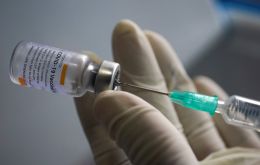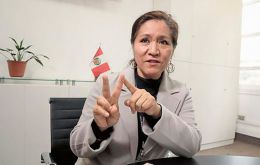MercoPress. South Atlantic News Agency
Tag: Vaccination
-
Monday, June 13th 2022 - 09:32 UTC
Argentines not too keen on taking Covid-19 booster shots

Argentine health authorities have reported that. although the COVID-19 pandemic is not over yet, fewer people showed up for their boosted dose of vaccine, due to a false low-risk perception which makes coverage not sufficient.
-
Friday, June 3rd 2022 - 09:34 UTC
4th dose of covid-19 vax will be the last until next year, Buenos Aires Minister forecasts

Buenos Aires City Health Minister Fernán Quirós said he believed it was “very likely” that the fourth dose of covid-19 vaccine would be the last this year and that the next immunization campaign will be ahead of the 2023 fall.
-
Monday, May 16th 2022 - 01:02 UTC
China's Sinovac Biotech building vaccine plant in Chile investing US$ 100 million

Chinese pharmaceutical Sinovac Biotech Ltd which makes one of the vaccines against Covid 19 most in several Latin American countries initiated on Thursday the construction of its first fill and finish plant in Chile, consolidating its presence in the Latin American country that has used its Covid-19 shot the most.
-
Friday, April 15th 2022 - 09:48 UTC
No more PCR tests or vax cards to enter Chile

Chile has lifted the requirement to submit a negative PCR test or proof of vaccination against COVID-19 for foreigners wishing to enter the country, effective Thursday, it was announced.
-
Tuesday, March 1st 2022 - 09:00 UTC
Uruguayan children skip 2nd vaccination appointment

One out every four Uruguayan children scheduled for the second dose of COVID-19 vaccine has missed their appointments over the past three days, leaving a sizable number of Pfizer units on the brink of expiration, it was reported Monday in Montevideo.
-
Saturday, February 26th 2022 - 09:28 UTC
Peru's vaccination chief resigns

Peru's Director of Immunizations Friday turned in her resignation to the Health Ministry citing declining efforts in the area to carry out its duties.
-
Tuesday, February 8th 2022 - 09:56 UTC
Chile starts applying 4th dose of COVID-19 vaccine

Chile Monday began applying the fourth dose of COVID-19 vaccine to its population after Jan. 10 additional boosters were injected to people with comorbidities, health care staff and those over 55 years of age as infections due to the Omicron variant was on the rise.
-
Tuesday, February 8th 2022 - 09:24 UTC
Brazil reports first two cases of Omicron subvariant

Brazil's Fiocruz Institute Monday announced the first two cases of the BA.2 sublineage of the SARS-Cov-2 Omicron variant had been detected in the country: one in the State of Rio de Janeiro and the other in the State of Santa Catarina.
-
Thursday, February 3rd 2022 - 09:55 UTC
US Army instructed to discharge unvaccinated soldiers

The Army of the United States Wednesday announced it would start discharging soldiers who are not vaccinated against COVID-19. As of January 26, 96% of the military were fully vaccinated, while 3,350 had refused to take any injection.
-
Wednesday, January 26th 2022 - 09:55 UTC
Over 50% of Uruguayans have received a booster dose of vaccine

Uruguay's Presidential Secretary Álvaro Delgado Tuesday encouraged more people to get vaccinated against COVID-19 after the Health Ministry announced 50.08% of the population has already taken a third dose immunizer against the virus.
